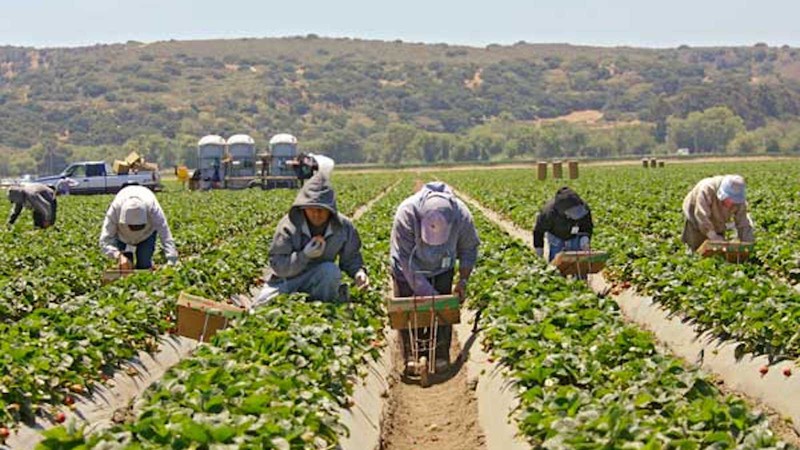The law, which took effect in May, lets workers cast votes by signing union cards.

Farm workers had argued that reforms now in place in California would reduce employer retaliation for unionization efforts. Holgerhubbs / Wikimedia Commons C.C. 3.0 Unported
BY , CalMatters
Workers at a Stanislaus County tomato farm and packing company are the first to successfully unionize under a new California law making it easier for farmworkers to organize, the United Farm Workers said today.
The workers organized under new rules enacted this year by a controversial new California law, which allows farmworkers to vote for union representation by signing union authorization cards, called card check.
The union said California’s Agricultural Labor Relations Board certified the election petition of workers at DMB Packing, also known as DiMare Fresh, based in the northern San Joaquin Valley town of Newman. Barely 51% of the company’s 297 workers voted for union representation, said Santiago Avila-Gomez, the executive secretary of the Agricultural Labor Relations Board. The company is disputing the results.
The workers organized under new rules enacted this year by a controversial new California law, which allows farmworkers to vote for union representation by signing union authorization cards, called card check. They’ll be part of UFW, which represents nearly 7,000 agricultural workers at 20 California companies. Although the union founded by Cesar Chavez and Dolores Huerta is still the most prominent advocate for farmworker rights in California and nationally, its membership has significantly decreased since the height of the farmworker movement in the 1960s and 1970s.
Prior to the new rules, farmworkers voted for union representation via a two-step “secret ballot” process that often took place at their worksite on employer property. In the summer of 2022, UFW members and supporters marched 335 miles from Delano to Sacramento to urge Gov. Gavin Newsom to allow farmworkers to vote via card check or by mail.
After months of public pressure—and a White House endorsement of the bill—Newsom and the UFW negotiated a compromise that allowed farmworkers to vote by card check, but removed the vote-by-mail option.
After months of public pressure—and a White House endorsement of the bill—Newsom and the United Farm Workers negotiated a compromise that allowed farmworkers to vote by card check, but removed the vote-by-mail option and other complicated administrative processes.
The previous version of the law, which went into effect in January, changed that to two options, allowing farmworkers to mail in ballots or vote via card check. The final version of the law went into effect in May.
During their year-long battle for the union election rules, the UFW and other labor advocates insisted that the secret ballot process made it difficult for farmworkers to organize without fears of retaliation from their employers.
Now, the UFW says this first election win is proof they were right.
“We have been fighting for a long time to try to protect workers,” said Teresa Romero, the UFW president. “This new law helped the workers have the safety net to be able to decide what they want to do. Their safety and job security is something we always want to protect.”
The UFW originally filed a petition with the Agricultural Labor Relations Board in September, but the board ruled the union didn’t yet have a majority. The board finally certified the election results on Oct. 23, but DMB Packing filed objections, claiming that the board mishandled the ballot process, that the UFW was counting workers that shouldn’t be included in the union and that workers were coerced into signing something they didn’t understand.
The last time the UFW won a union election was in 2017, when workers at a raspberry farm in Watsonville narrowly voted for union representation. The company appealed, fighting orders to negotiate with the union for years before filing for bankruptcy and laying off hundreds of workers.
The board will hold a hearing on the dispute during the last week of November. Although the company can still appeal the results, the board will eventually issue a final decision on the validity of the election. The administrative process is “new territory” for the board, Avila-Gomez told CalMatters, because this is also the first election petition submitted under the state’s new rules.
DMB Packing, which currently disputes the election results, said in a statement that it supports and respects the rights of farmworkers. “We will continue to utilize the legal and regulatory process to ensure a fair election where the results represent the will of the majority of DMB Packing employees,” the company said.
The last time the UFW won a union election was in 2017, when workers at a raspberry farm in Watsonville narrowly voted for union representation 269 to 236. The company appealed the results, fighting orders to negotiate with the union for years before filing for bankruptcy and laying off hundreds of workers at the start of the COVID-19 pandemic in March 2020. The UFW eventually secured settlements for laid off workers, spokesperson Antonio de Loera-Brust said.
Although the fledgling union of DMB Packing farmworkers still has to navigate a potentially-long administrative appeals process and company negotiations, Romero said she believed their initial victory would encourage other farmworkers to organize and to feel more comfortable about their anonymity and job security while voting in elections. She said the UFW is expecting more successful union certifications elsewhere in the state soon.
“We marched last year, 335 miles or more, and it was done with the purpose of making it safer for farmworkers to organize for union representation,” Romero said. “We have our first certification, and it happened because workers had the ability to sign a card and not be intimidated by employers and supervisors.”
The article titled “UFW wins first farmworker union vote under new California law” appeared first on CalMatters.org.
CalMatters is a nonprofit, nonpartisan media venture explaining California policies and politics.